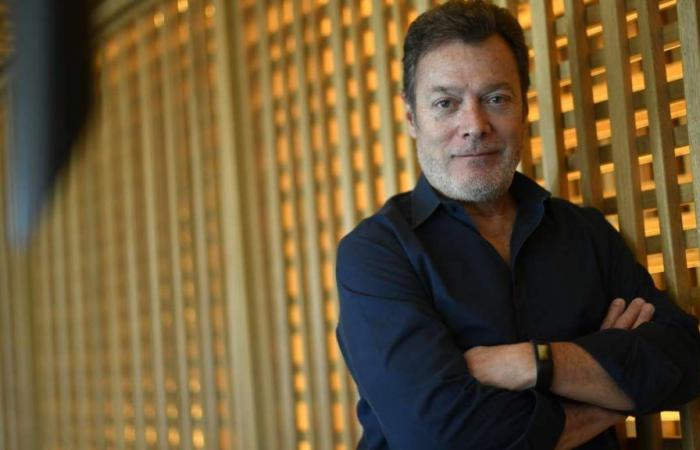Juan Carlos Botero, columnist and author of books such as “The Casual Facts”, “The Art of Fernando Botero” or “The Seeds of Time”.
Photo: Óscar Pérez
Just as we don’t change our passions, it seems that we don’t change our obsessions either. There are doubts, questions or ideas that we never abandon because all the answers we find will continue to give meaning to life. Perhaps the obsessions are like the utopias that Fernando Birri mentioned, perhaps they all help us walk and we will never fully achieve them, because to do so would be to fall into the absurdity of existence.
26 years have passed since Juan Carlos Botero published The Windows and the Voices, a work that can be understood as a book of stories, but also as a novel with seven episodes, since what unites all the stories is that the character is the same , so in some it does not appear with your name. In all this time many things have changed in Botero’s life and profession as a writer, but what does seem to remain is the interest and doubt in themes that continue to be transversal in his work.
“The most necessary and most revolutionary attitude is decency. At other times it was the fight. We have to disarm our hearts, practice courtesy, listen respectfully to others from a position of permeability, tolerance and self-criticism. We must continue trying to elevate the debate and get it out of the gutter. We have to see ourselves as brothers and compatriots, no longer as enemies,” said Juan Carlos Botero in an interview for this newspaper.
You talk in the epilogue of the book about some tools that you would have liked to have had 16 years ago to write these stories, what are they?
Since I published the book I had the dissatisfaction of feeling that there were things that could have been better, that I could have ironed out some sentences. I was aware that there were blunders in the book. Here are two stories about the sea, since then, I have written two novels on the same topic. I learned a lot about this; The terminology and potential of the sea as an ideal setting to place a character in an extreme situation is enormous. I now adapted that maturity to these stories, since I rewrote them in their entirety with that new experience, with that new knowledge of the craft, which is something that one acquires week by week.
How much have obsessions changed in these 20 years?
It caught my attention to realize that the stories were not bad at all, that it was even enough to polish some parts. That was very pleasant. The other thing was understanding that many of the elements, obsessions and concerns that I raise there have been developed in other books. It was interesting to realize that this book was the moment when those concerns were expressed for the first time. For example, the concept of the transience of existence, the preciousness of the fact that a life can escape dramatically from one moment to the next depending on trivial things. The concept of friendship, love and heartbreak, all of that is present in this book.
The transience of life and the chance that determines it is seen above all in the first two stories or chapters…
People aren’t really aware of how limited this is. We all act as if we were immortal, that’s why every time a tragedy arises it catches us totally disarmed and very vulnerable. I believe that one of the tasks of literature is to communicate that teaching, to show how life is supremely limited. In part, there is also a somewhat unfortunate influence of the Catholic Church, which has created a culture in which we have grown up and in which things from another world, the eternal, have been rewarded and valued, where earthly life has been despised. , and I think it should be the opposite. If we did not have that awareness of what is limited, for example, we would not take so much care of a relationship. Being aware of this transience makes us appreciate and care for things more.
More than death, there is a relationship with loss that runs through all the stories or chapters…
There are many losses in the book, including that of love. These stories are seven independent stories with the same character who appears with or without a name, so they can be read out of order, or they can also be read as a novel with seven chapters. That allowed me to do something that I like and that is to tell a story that is attractive, but at the same time with lessons that allow for a deeper reading. That is why in the descent with respect to the loss of love the physical descent takes place in the Caribbean, and the internal descent in his own psychology, so in that loss what he was looking for was Shakespeare’s epigraph, the seven capital moments in life of this character are the seven fundamental lessons, and almost all of them happen from that fact: he loses his innocence in the last story, in another he loses love, in another his friendship. Loss is the most painful, but at the same time the most formative.
And what is its relationship with loss?
I have experienced it many times. I have felt the loss of love, of very important people in my life, of health – because I had a very terrible cancer – and of friendship. These experiences, no matter how painful they are, have one positive thing and that is that they are formative, as we just said. In one way or another, we all have the same human condition, and as one puts one’s hands into the roots one touches what is common to all people. That’s also what literature is about, reaching those experiences that are universal.
There is also a concern for everyday life…
There is magic in everyday life. That is to say, one always believes that the everyday is the banal, the trivial, the inconsequential, but you have to have a very alert eye to realize that the everyday is a mirage and a sum of magical moments. In the last story the character discovers that each platform, that each street changes depending on the time of day, the pedestrians that pass by… The same space is constantly changing. Everyday life and life are full of options and possibilities for great adventures: some good, some bad, some terrible.
Let’s talk about friendship, another of the elements present in these stories…
What I like about this book is that all the stories are based on personal experiences, except for the first one. That allows me to tell them with verisimilitude, because I lived them firsthand. In the case of the last story, the same thing happened to me as to the character. I didn’t have friends my age until I was 13, and I hadn’t had access to the city until that age, and when I did, it was a revelation to me. With a friend, or several, we would take night tours and my passion was such that I would accompany them afterwards to their respective houses and fall asleep on the platform. That discovery of friendship was tremendous for me. Friends are the brothers that one voluntarily chooses, and that mutual choice is sacred. In the book I want to glorify several things, one is nature, another is friendship.
In the story that bears the name of the book, the theme of violence is touched on, and something that you call the loss of innocence…
Every day we look at a screen and receive a systematic bombardment of violent events. Little by little, by dint of repetition, there is a familiarization with violence, people become narcotized in the face of this and end up not only reproducing it but also becoming victims. In Colombia there is a very big mistake and that is believing that violence is committed by distant others, but that is not true. Unfortunately we live in a culture of violence, and the same thing happens with machismo. In Latin America people are sexist, that infects everyone. We, without being aware of it, by living in a culture end up reproducing that violence, and if you think I am exaggerating, you have to see how we treat each other, how we argue, how we lead, how we live together.
Let’s talk about the child who observes with curiosity how a door in the party place separates the world of the elite from the world of poverty…
Great works of art have something very interesting and that is that painters and authors recreate the world they lived in aesthetic praise, but at the same time they take a certain distance to have a critical look at that world. The child’s gaze is uncontaminated and fresh, but it reveals a world on the brink of collapse: an aristocracy that abandoned the country, protecting its privileges instead of modernizing it. This attitude led the country to its destruction, in a great collective suicide without realizing it. This story is intended to be a moral or metaphor for said collective suicide.
In one of the dialogues of that story they say that “this is how we treat heroes in our country,” referring to another phrase that says “here the envy is greater than the pride and fame of others that we find unbearable.” What do you think about envy?
There is a very great effort to achieve success, glory, fame, but as soon as the person is at the top, there is a very dangerous desire in the country to knock him down, to question him, whether he arrived by cheating. I once heard a lecture by Robert Wright, here in Colombia, where he mentioned that our problem lies in a culture of envy. According to him, we have not understood that certain countries are dominated by this type of culture. Envy prevents one from moving up, for fear that the neighbor will also do so, which stagnates growth. It is no coincidence that all the country’s great artists succeed abroad; because there is no tolerance for fame, success is prohibited in Colombia.
If you are interested in continuing reading about El Magazín Cultural, you can enter here






